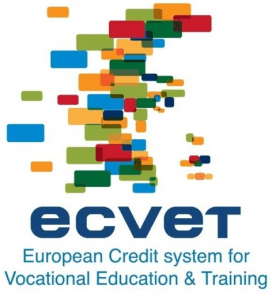Mantente actualizado sobre este proyecto en su categoría.
 A principios de Agosto nos ha comunicado nuestro socio francés y coordinador que el proyecto EasyECVET ha sido aprobado por la Agencia Nacional Francesa. CCCA-BTP, el coordinador, es una institución francesa con la que trabamos contacto a consecuencia de un proyecto eTwinning que desarrollamos el curso pasado denominado Safety in the workshop con el centro BTP CFA Isére dependiente de ellos.
A principios de Agosto nos ha comunicado nuestro socio francés y coordinador que el proyecto EasyECVET ha sido aprobado por la Agencia Nacional Francesa. CCCA-BTP, el coordinador, es una institución francesa con la que trabamos contacto a consecuencia de un proyecto eTwinning que desarrollamos el curso pasado denominado Safety in the workshop con el centro BTP CFA Isére dependiente de ellos.
Los créditos ECVET son una recomendación del Parlamento y del Consejo del año 2009 relativa a la creación del Sistema Europeo de Créditos para la Educación y Formación Profesionales.
Sus objetivos son:
- Facilitar la convalidación y el reconocimiento de las aptitudes y conocimientos profesionales adquiridos en sistemas y países distintos, de manera que los interesados puedan incluirlos debidamente en sus cualificaciones profesionales.
- Potenciar el atractivo de la movilidad entre distintos países y entornos educativos.
- Incrementar la compatibilidad entre los distintos sistemas europeos de educación y formación profesionales y las cualificaciones que otorgan.
- Aumentar las posibilidades de empleo de los titulados en formación profesional y la confianza de los empresarios en que cada cualificación en FP requiere unas aptitudes y unos conocimientos específicos.
Los socios que participan en el proyecto además de nosotros son:
- CCCA-BTP (Francia). Coordinador.
- SATAEDU (Finlandia).
- Roskilde Tekniske Skole (Dinamarca).
- Centre IFAPME (Bélgica).
A continuación os dejamos un resumen del proyecto en inglés:
Project Aim
Facilitate the implementation of ECVET in order to trivialise its use in the context of individual or group mobility.
Objectives
- present and share practices.
- identify the added-value to implement ECVET assessments.
- propose methodological frameworks.
- design and harmonise tools dedicated to the implementation of ECVET.
- execute ECVET actions in the context of learners’ mobility (apprentices, staff, mentors/tutors)
Duration
36 months. Start in October 2020 to end up in Autumn 2023. 6 meetings – 2 per year – to enable each partner to implement the elements as the project proceeds.
Main issues
- The meaning of the ECVET framework, its advantages and limitations.
- Brakes and levers to the implementation of ECVET.
- Assessment practices of mobility actions (presentation and questioning).
- Recognition of learning outcomes (from assessment to certification)
Stakes to address
- How can the recognition of learning outcomes via ECVET be implemented in a simple way?
- How far can we go with ECVET?
- How can mobility partners be involved and engaged in the ECVET framework?
- How can the current brakes be lifted?
Activities
Transnational meetings
1 every 6 months, centred around project management, but also on joint work to share and pool the experience acquired, to provide food for thought, to build up collective skills and joint actions. The following topics will be discussed during the various meetings:
- Rereading of the ECVET framework and presentation of each partner’s experiences with ECVET.
- Brakes and levers for the implementation of ECVET.
- Finding out and proposing solutions and actions of implementation.
- Case studies and pilot actions implemented or under development.
- Fields of application of ECVET in the different types of mobility.
Learning activities
Between 1 and 4, in order to support the drafting of a practical guide and provide feedback. involving referents and/or mobility coordinators of the partners’ training institutions to support the drafting of a practical and experience-based guide. Such as:
- technical workshops on the development of specific ECVET tools.
- technical workshops to work and write approaches, procedures or strategies.
- participation of an ECVET expert in one of our meetings.
Deliverables
Digital downloadable format, video, interactive document …, such as a good practices handbook, a support guide, a toolbox.
Targeted dissemination
Of the productions in our respective learning networks.
Expected impatcs
- On the project partners: facilitating the implementation of ECVET assessments in their European mobility actions.
- On the learners: being aware of the stakes of a period of mobility and initiation to assessment, thinking of a certification done partly at a European level.
- On the teams of trainers or teachers: open-mindedness to other assessment methods and professionalization of teaching on evaluation practices.
- On all the protagonists: harmonisation and facilitation of exchanges in the framework of European mobility actions.
